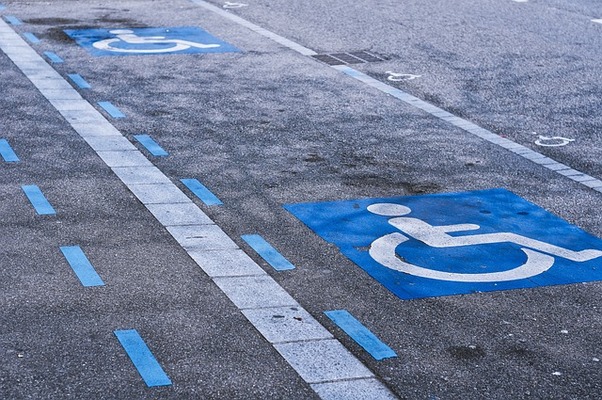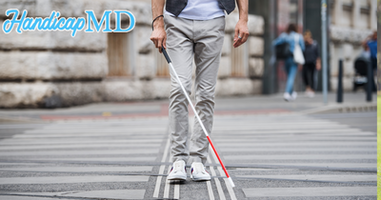
Introduction: Make Travel Easy With Your Handicap Placard
Traveling as a disabled driver or passenger can be challenging, but your handicap placard opens up accommodations that make trips smoother. This guide will help you navigate travel with a handicap placard, whether you’re driving across state lines or flying to your dream destination.
Learn how to ensure your handicap placard works for you everywhere you go.
Flying With Your Handicap tag
- Why You Should Bring Your tag: Most airports have accessible parking areas, but you’ll need your placard for verification.
- Requesting Additional Assistance: Airlines offer services like wheelchair assistance, priority boarding, and accessible seating.
- Temporary Permits for Long-Term Stays: If flying out of state, learn how to obtain temporary disability permits in your destination state.
Driving Across State Lines With Your Handicap Placard
Understanding Reciprocity:
Most states honor out-of-state handicap tags. However, the privileges (e.g., free parking) may vary.State-by-State Guide:
Include key differences for major states with easy-to-read tables summarizing:- Free or metered parking
- Maximum allowed time
- Temporary permit requirements
Using Your Placard in Rental Cars and Rideshares
- Rental Cars:
Your placard is valid in any vehicle you drive. Ensure it’s displayed correctly in rental cars. - Rideshares (Uber, Lyft):
Discuss informing drivers about accessibility needs, such as extra loading time or space for assistive devices.
Avoiding Fines and Penalties
- State Laws You Need to Know:
Cover common rules, such as penalties for misuse or failing to display the placard properly. - Tips to Avoid Common Mistakes:
Examples: Forgetting to hang your tag, parking in spaces marked for specific disabilities.
International Travel With a Handicap Placard
- Traveling Abroad:
Many countries do not recognize U.S. placards. Share steps to obtain an International Symbol of Access permit. - Renting Accessible Vehicles:
Discuss how to find accessible vehicles or taxis in popular international destinations.
What to Do if You Lose Your Placard While Traveling
- Emergency Replacement Options:
Include tips for obtaining a replacement or temporary permit while away from home. - Proactive Steps Before You Travel:
Suggest carrying photocopies or digital images of placard-related documents.
Benefits of a Handicap Placard While Traveling
- Convenience and accessibility in crowded areas like airports, stadiums, and tourist attractions.
- Reduced parking stress, especially in urban areas.
- Enhanced safety and mobility.
State-by-State Guide to Using Your Handicap Placard Across the United States
If you’ve ever asked yourself, “Can I use my handicap placard in another state?” the answer is generally yes. All 50 states recognize handicap placards issued by other states. However, specific rules and privileges vary, and understanding these nuances is essential to ensuring a smooth travel experience. From free metered parking to time limits, knowing the local regulations can save you from fines or inconvenience.
Here, we’ve expanded on the rules for each state to give you a more comprehensive overview of how to use your handicap placard. This guide will help you plan your journey with confidence.
General Guidelines
- Reciprocity: Most states honor out-of-state tags, but the privileges (e.g., free parking, extended time) may differ.
- Documentation: Always keep your tag displayed and carry proof of disability or placard registration, as some states may request verification.
- Research: Before traveling, check the local DMV or government website for up-to-date regulations.
Detailed State-by-State Breakdown
Alabama
- All U.S. state-issued placards are valid.
- Parking in designated spots is allowed without additional fees.
Alaska
- Valid for use, but all parking must be paid for, and strict adherence to posted time limits is required.
Arizona
- Out-of-state placards are recognized, granting full access to designated spots.
Arkansas
- Visitors with valid placards from any state can park in designated spaces without restrictions.
California
- Visitors may require a 90-day travel placard from the California DMV.
- Offers free and meter-exempt parking, including green curbs (time-limited zones) and residential areas, generally for up to 24 hours.
Colorado
- Placards are recognized statewide, but parking regulations vary by city. Contact local authorities for specific rules.
Connecticut
- Out-of-state placards are valid.
- Metered parking requires payment but has no time limits.
Delaware
- Placards from other states are honored with full parking privileges.
Florida
- Visitors can use out-of-state placards for free parking in most metered spots (up to 4 hours) and designated spaces.
- Free parking is often allowed in certain lots; check specific lot rules.
Georgia
- Any valid U.S. placard is accepted, providing full parking accommodations.
Hawaii
- tags are valid.
- Metered parking is allowed for 2.5 hours or the maximum posted time, whichever is longer. Payment is required.
Idaho
- Visitors with valid placards enjoy free parking at metered spots without a time limit, but free lot parking may vary.
Illinois
- Out-of-state tags are valid.
- Metered parking is generally free, with no time limit except in zones limited to 30 minutes or less.
Indiana
- Valid tags from any state are accepted for full use of accessible parking spaces.
Iowa
- Visitors with out-of-state tags can park in designated spots without restrictions.
Kansas
- Metered parking is free for up to 24 hours with a valid out-of-state placard.
Kentucky
- Placards are recognized. Visitors are granted an additional 2 hours beyond posted limits in time-restricted parking zones.
Louisiana
- Out-of-state tags are valid and provide access to designated parking.
Maine
- Visitors can park for free at metered spots for up to twice the maximum time allowed.
Maryland
- tags are accepted. Metered parking is free for up to twice the posted time, not exceeding 4 hours.
Massachusetts
- Out-of-state tags are valid, but metered parking rules vary. Some areas may require payment.
Michigan
- Visitors with valid tags can park in designated spaces without restrictions.
Minnesota
- Metered parking is free for visitors with valid placards, with no time limits unless specified.
Mississippi
- Out-of-state placards are accepted for parking in accessible spaces.
Missouri
- Placards from any U.S. state are honored without additional requirements.
Montana
- Visitors can use their placards to park in designated spaces without restrictions.
Nebraska
- Out-of-state placards are valid and provide full parking privileges.
Nevada
- Placards are recognized, but metered parking must be paid for, and time limits apply.
New Hampshire
- Free metered parking is allowed, but time limits vary by city.
New Jersey
- Placards are valid except on NYC streets.
- Metered parking requires payment but allows exceeding time limits if the maximum fee is paid.
New Mexico
- Out-of-state tags are fully recognized.
New York
- Placards are valid statewide but not on NYC streets unless you have a specific NYC parking permit.
North Carolina
- Visitors can park without time limits in time-restricted parking zones.
North Dakota
- Out-of-state tags are recognized.
Ohio
- Valid tags allow for 2 additional hours beyond posted time limits.
Oklahoma
- Placards are valid for all designated parking spaces.
Oregon
- Visitors can park for free without time limits at metered spots unless otherwise stated.
Pennsylvania
- Visitors with valid placards are granted an extra hour beyond posted limits.
Rhode Island
- Out-of-state placards are fully valid.
South Carolina
- Free parking at metered spots is granted with no time restrictions.
South Dakota
- Visitors can park in time-limited zones without restrictions.
Tennessee
- Metered parking is free and without time limits for visitors with valid placards.
Texas
- Placards allow free parking at metered spots with no time limits.
Utah
- Visitors can park at metered spots free of charge for reasonable durations.
Vermont
- Out-of-state placards are valid for accessible parking spaces.
Virginia
- Free parking at metered spots for up to 4 hours is allowed with valid placards.
Washington
- Placards are valid for free parking within maximum stated time limits.
West Virginia
- Unlimited parking in time-restricted zones is permitted for visitors with valid placards.
Wisconsin
- Visitors can park without time restrictions in areas with limits of 30 minutes or more (up to a 24-hour maximum).
Wyoming
- Out-of-state placards are valid without additional requirements.
Pro Tips for Traveling With a Handicap Placard
- Display Properly: Always hang your placard visibly on the rearview mirror or dashboard.
- Carry Documentation: Keep a copy of your placard registration in case you’re asked to verify its validity.
- Stay Informed: Rules may change. Double-check state-specific regulations before you travel.
Special Notes for ISA License Plates
The International Symbol of Access (ISA) license plates allow universal recognition across all states without requiring transfers between vehicles. They are especially useful for frequent travelers.
Need a Handicap Parking Permit? Let HandicapMD.com Handle Everything for You!
Obtaining a handicap parking placard or plate doesn’t have to be a time-consuming or confusing process. At HandicapMD.com, we make it simple, fast, and hassle-free. Here’s how we do it and why we’re your best choice:
1. No Guesswork – We Handle the Medical Certification for You
Most people start the process by consulting their healthcare provider, but that often means long wait times, paperwork confusion, or worse—uncertainty about whether your condition qualifies. With HandicapMD.com, there’s no need for that.
We take care of everything! You simply:
- Complete a quick online questionnaire.
- Have a brief, convenient phone or video call with one of our licensed doctors.
We’ll review your case, handle the medical forms, and provide the certification you need—all from the comfort of your home.
2. No DMV Headaches – We Guide You Through the Entire Process
Dealing with your state’s DMV can be overwhelming. Every state has different rules, forms, and fees. Don’t waste hours navigating confusing websites or waiting in line.
When you choose HandicapMD.com:
- We’ll walk you through the exact steps for your state.
- We’ll help you avoid mistakes or delays.
- In many cases, we can assist you in submitting your documents online, saving you a trip to the DMV.
3. Transparent Fees and Stress-Free Convenience
Every state charges different fees for handicap parking permits—some are free, while others charge a small amount (usually $10–$25). With HandicapMD.com, you’ll know exactly what to expect upfront. We keep things simple:
- No surprise costs.
- No running back and forth for missing paperwork.
- A clear, stress-free process designed with your convenience in mind.
4. Why Choose HandicapMD.com?
Here’s what sets us apart:
✅ Expertise You Can Trust: Our licensed doctors specialize in disability evaluations. We know exactly what it takes to meet state and ADA requirements.
✅ Save Time and Effort: No need to juggle doctor’s visits, incomplete paperwork, or confusing DMV rules. We simplify everything for you.
✅ 100% Online Convenience: Get everything done from the comfort of your home, on your schedule.
5. Don’t Wait – Get Started Today!
Life is stressful enough without worrying about parking accessibility. Let HandicapMD.com take this burden off your shoulders.
All we need is a few minutes of your time to get started. In return, we’ll handle the medical certification, DMV paperwork, and any questions along the way—ensuring you get your handicap parking permit quickly and easily.
Click below to sign up now and see how simple it can be to regain your independence with HandicapMD.com!
By choosing HandicapMD.com, you’re choosing expertise, convenience, and peace of mind. Let us help you take the first step toward a more accessible and stress-free life today!
Whether you're planning a cross-country road trip or a flight across states, HandicapMD.com ensures you have the documentation to enjoy the journey stress-free.
Enjoy Stress-Free Travel With Your Handicap Placard
Your handicap placard is more than just a piece of plastic—it’s your gateway to accessible travel. By understanding the rules and benefits, you can explore new destinations with confidence.
Ready to make travel easier? Apply for or renew your handicap placard today with HandicapMD.com.
.png)





